Sun 27 Nov 2022
A SF TV Episode Review by David Vineyard: THE OUTER LIMITS “The Bellero Shield” (1964)
Posted by Steve under Reviews , TV Science Fiction & Fantasy[7] Comments
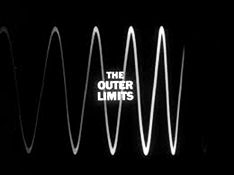
THE OUTER LIMITS “The Bellero Shield” ABC. 10 February 1964. Martin Landau, Sally Kellerman, Chita Rivera, Neil Hamilton, John Hoyt as the voice of Bifrost, Vic Perrin the voice of Control. Teleplay by Joseph Stefano. Story by Lou Morheim and Joseph Stefano (Leslie Stevens uncredited). Directed by John Brahm.
If somehow you have never seen this episode this review contains SPOILERS!
— the voice of Control introducing “The Bellero Shield.”
Heady stuff, but pretty standard for The Outer Limits, the SF anthology series taking control of your television set weekly (“We control the horizontal. We control the vertical.”) that took the pretentious voice of Science Fiction Theater (Truman Bradley) and the social awareness of Rod Serling’s The Twilight Zone, the monsters of Boris Karloff’s Thriller, and the sheer oddity of One Step Beyond, and dressed it up with a stronger than usual science fictional dressing (not that it was particularly deep science fiction in most episodes).
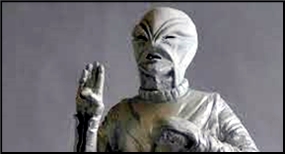
In “The Bellero (pronounced bell-a-ru) Shield” Martin Landau is scientist Richard Bellero who has spent his life seeking the approval of his father cold demanding Richard Senior (Neil Hamilton, who had appeared in another role in the anthology series the week before). Richard is experimenting with a laser from the laboratory in the top floor of his mansion, and as usual has failed to garner his father’s support.
Senior expects his son to discover something that will make him immortal and cover the Bellero name in glory. Money means nothing.
Richard is of course upset, but not as upset as his wife Juidth (played with icy femme fatale perfection by Sally Kellerman) who is not content with money. Judith has long dreamed of what she remembers from childhood as “the trembling way,” a metaphor for the Nordic rainbow bridge Bifrost that bridges heaven and earth, not mere wealth (Richard has more than enough of that without his father), but godlike power and prestige.
Between Senior’s lust for glory and Judith’s passion for power Richard is pretty much screwed, and we mustn’t forget Judith’s almost alien Mrs. Danvers-like devoted servant in black the barefoot creepy and unnaturally devoted Mrs. Dane (Chita Rivera, whose bare feet in this episode should get a second credit).
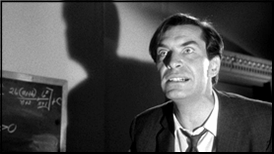
To be honest, Landau, a first class over-actor himself, has little to do here against Kellerman’s cold hearted Randian goddess, Hamilton’s Miltonic patriarch, and Rivera’s satanically devious servant. It may be the only time in his career his is the most normal character in the cast.
Enter what Stefano, who co-produced the series, called the “Bear,” the thing that made The Outer Limits different than every other similar anthology series, the monster of the week. Of course we aren’t talking your average “bear” (sorry about that, couldn’t resist) in most cases. More often than not the “bear” was the most sympathetic character in any episode and the real monsters wore human skin, and it was always a semi science-based monster, no vampires, witches, or werewolves, though BEM’s were welcome.
Here the “bear” is an alien transported to Earth by Richard’s laser beam. This alien, christened Bifrost (voiced by John Hoyt) is an advanced being who almost immediately has a shared scientific bond with Richard, but Judith is less interested in exploiting the first contact with a creature from another world than getting her hand on the shield that protects Bifrost, an impenetrable protection that can be extended to cover vast areas from a single unit.
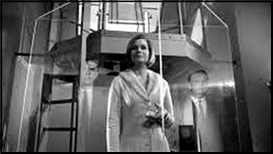
Judith sees the shield as the key to her ambition and pressures Richard to bring back his Father so she can show it to him, but while Richard is gone, Bifrost is becoming anxious to return home, afraid he will miss his chance, and after a well-written scene where he sums up Judith by “reading her eyes” (“Throughout the Universe all species that have eyes can be understood through them.”), he tries to leave and Judith kills him hiding him in the cellar with Mrs. Dane’s help.
Richard returns with his father, and Judith shows him the shield, allowing Mrs. Dane to fire a harmless bullet at her and Senior a laser weapon Richard invented, but when she goes to turn the shield off, she cannot. She is trapped and nothing can penetrate the shield whose protection projects far into space and deep in the Earth (that Heaven and Hell metaphor is no accident here).
Meanwhile Senior and Mrs. Dane clash over the body of Bifrost. Senior telling Mrs. Dane who is trying to hide the body: “Great men are forgiven their murderous wives,” when she warns him Richard too will be implicated before Mrs. Dane pushes him down the basement stairs.
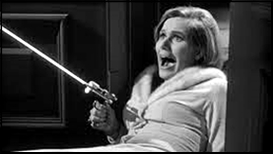
This all owes more to Weird Tales or Unknown than most Science Fiction, more in line with H. P. Lovecraft or Clark Ashton Smith and the kind of SF represented by William Sloane’s The Edge of Running Water and To Walk the Night, C. S. Lewis That Hideous Strength, Jack Finney’s Invasion of the Body Snatchers, or John Christopher’s The Psychogeists. It is the dark nightmare edge of Science Fiction, less the literature of ideas than the monsters of the id they set free. Outer Limits avoided the fantasy and whimsy of some Twilight Zone episodes and the cheeky nihilism of Alfred Hitchcock Presents, but does lay it on a bit heavy at times. This one just skirts that, finding a solid footing despite all the Gothick trappings and foundation in basic Greek Tragedy 101.
At times “The Bellero Shield” makes you wonder if writer/producer Stefano happened to read Edith Hamilton’s Mythology the week before while brushing up on his Freud and Jung.
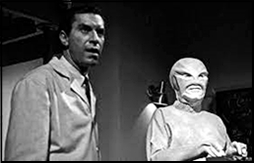
Bifrost isn’t dead, much to Mrs. Dane’s chagrin and we get yet another metaphor, this one Christian as Bifrost sacrifices himself to save Judith, who tried to kill him.
“I expected it to kill me,” Mrs. Dane says, “but it looked into my eyes and I heard myself saying: ‘Can you help me?’
And it said: ‘Can I not?’
Unlike some of the other series mentioned here The Outer Limits episodes were more likely to end in irony than rough or ironic justice. Here Judith is freed from the shield, but when Richard tries to comfort her telling her it is gone and now they can go to the authorities and try to explain what has happened, Judith reveals she has been driven mad and will always be a prisoner of the Bellero shield: “No, it’s here. I can see it. It will always be here. Nothing can remove it. Nothing…Nothing!”
And as Control reminds us before returning control of your television to you:
Boris, Rod, and Sir Alfred couldn’t have said it better.
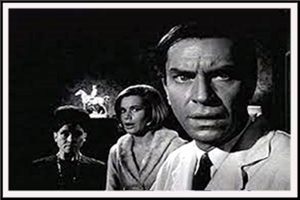
November 28th, 2022 at 9:25 pm
This was not a TV series I ever watched when it was on — I was away at college — but my sister loved it, and I trust her judgment. Nice cast in this one, no doubt about it.
November 29th, 2022 at 8:50 am
That’s Vic Perrin, stalwart of Hollywood’s ‘Radio Row’. He appears in hundreds of radio broadcasts like Fort Laramie, Gunsmoke, The LineUp, etc. One of the greatest voice actors ever.
‘Outer Limits’ was always worth a look anytime even a re-run aired.
Swell review!
November 29th, 2022 at 10:40 am
The episode can be seen here:
https://www.youtube.com/watch?v=V3FA5FF_ILY
November 29th, 2022 at 10:57 am
Terrific, Tony. Thanks!
November 29th, 2022 at 8:02 pm
I don’t think any series on television owed as much to German Expressionist Cinema as THE OUTER LIMITS on a weekly basis. This one is shot almost entirely on interior sets, but the use of camera angles and wide angle set ups opens it up to a feeling of the vast and terrifying unknown.
Lighting is key too, with Kellerman seeming to glow in her white gown while it is hard to imagine a deeper black than Rivera’s dress.
I like to it doesn’t feel the need to explain Rivera’s strange devotion to Kellerman, it just lays it at our feet and expects us to read between any lines. It does much the same with her marriage to Landau, all defined by attitudes and a few lines of dialogue with virtually no exposition about their relationship.
It seems as if it would be a fairly slow hour as described, but though it is short on action and heavy on dialogue it isn’t.
Of course, none of that style would add up to much without first class performers, scripts, and directors, noit to mention that score.
in general OL bordered on silliness, but usually managed to walk that thin line between pretense and nonsense and deliver on its promises for the course of the hour which is still the trick for the fantastic today.
The relatively low budgets, the restraints of what could actually be done in camera and with special effects, and the need for a “bear” in every episode somehow all worked in its favor, and despite lacking the class or cleverness of TWILIGHT ZONE or either of Hitchcock’s series it carved its own niche and often was more sheer fun than the more prestige competition.
November 29th, 2022 at 9:16 pm
Not that it matters …
Chita Rivera’s character is Mrs. Dame.
And you can all feel free to attach any signifiance you want to that …
When I saw the first airing of this in 1964, I was thirteen years old; much of the content here sailed right over my little head …
Now I am two-and seventy – and oh, ’tis true, ’tis true …
March 11th, 2025 at 1:45 pm
Outstanding review. Very literary yet witty and entertaining. I just have no idea what the %^@@ acronym thing means…I guess my shield prevents translation or something. Thanks